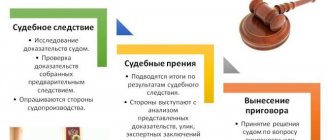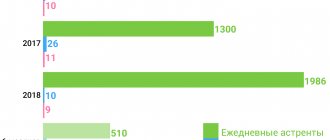An order is a judicial act to collect a debt. It is issued by a magistrate at the request of the creditor (claimant). This action takes place in a simplified manner and without a trial. That is, no debate between the parties with wringing of hands in the courtroom. With the received order, the debtor can immediately contact the bailiffs to demand compensation for the debt.
The bailiff has the right to initiate enforcement, seizure, and sale of assets. For the defendant, these claims may come as a surprise unless, of course, he has received a copy of the document.
Having learned about the beginning of debt collection, you can find the court order by its number or by the name of the defendant. This can be done via the Internet, by searching the FSSP materials, or in the magistrate’s court. Read more about this in our material.
Where to view a court order for debt collection
Let's look at how to find out the number of the court order and familiarize yourself with its contents if you did not receive it at the issuance stage. Note that the debtor can act not only independently, but also through a representative. For example, it could be a lawyer. A representative under a power of attorney will be able to submit requests and applications, receive copies of documents, and appeal against unlawful actions.
Our lawyers are ready to help if you are faced with a penalty under a court order and do not know its number and date of issue.
On the court website
The easiest way is to find a court decision or find out about the case number via the Internet. Such information is published on the website of each judicial authority. Typically, collection is carried out through the magistrate's court at the location (registration) of the defendant. Therefore, to obtain information about the case number, proceed as follows:
- enter the name of the judicial authority in a search engine (if you know it);
- if you cannot indicate the name of the court, it can be found through the GAS Justice information portal (for example, there you can select a judicial body on a graphic map based on your residential address);
- on the court website, go to the “Court Proceedings” tab, select “Search information on cases”;
- in the search form, fill in the data that you have (for example, in many cases you can find a court order by the name of the debtor, even if you do not know the case number);
- in the search results, select the card you need (you can open each card to compare your data);
- on the card you can see the case number, the date of receipt of the material and the issuance of the judicial act, the name and surname of the judge, and other information.
What does an objection to a court order look like?
Finding a court order will be difficult if you are only looking for information by last name. Using the most common surnames, a search can even return dozens of cases, especially if we are talking about a magistrate’s court in a big city.
On the website of the judicial authority, you can log into your personal account to gain access to electronic copies of documents. Login is possible using a government services account or digital signature. Without logging into your personal account, you cannot receive a certified copy of the order, but general information will be available even in this case.
If you were able to find out the judge and the case number, you can apply for a copy of the document. To do this, submit a written application addressed to the judge. In the application, be sure to indicate the case number and the date of the judicial act.
In the materials of enforcement proceedings
You can view the court order in the proceedings with the bailiff if compulsory execution has already begun. To view the materials, you must submit an application. You can not only read the text of the court order, but also make a copy of it.
The fastest way to obtain copies of the case materials is to contact the FSSP in person. However, it is advisable to clarify the work schedule of the bailiff handling your case. In addition, during the pandemic, personal reception of citizens is often limited to a few hours a week.
It is not possible to request copies of documents by email. The bailiff is not obliged to respond to such requests. But through government services, you can send almost any request to the FSSP to receive information about the progress of the case. The report or response to the request will also indicate the grounds for the penalty, i.e. number of the judicial act (case).
On the FSSP website
You can check the court order using the enforcement proceedings number on the FSSP portal. There, a databank of all cases initiated by bailiffs is publicly available.
To find a case, in the search form you need to indicate the region and the name of the debtor. It is advisable to indicate your date of birth to get a more accurate search result.
Search form for a court order in the debtor database on the FSSP website
How to find a court order by case number online on the FSSP portal? The search results will provide the following information:
- general information about the debtor;
- number and date of initiation of proceedings;
- number and date of issue of the writ of execution (in particular, the order number will be indicated there);
- a brief description of the subject of collection (for example, the debt and its amount);
- information about the bailiff handling the case (including a telephone number for contact).
Having received this data, you will be able to contact the judicial authority or the FSSP, familiarize yourself with the order or receive a copy of it.
Through government services
It is impossible to directly find out the court decision or obtain a copy of it through government services. But users of government services have the opportunity to:
- send an appeal to the FSSP, including a request for a report on the progress of the proceedings;
- find out about the availability of open collection cases;
- file complaints about unlawful actions of FSSP employees.
Search for an order on State Services
There is no unified database of debtors' names in public services. To obtain a copy of the court order, you will still have to contact the FSSP or the court.
How quickly can I find out the court's decision?
If you participated in the hearing, you can find out the court’s decision immediately when it is announced. In addition, on the same day you have the right to receive a judicial act in your hands, but only in an abbreviated form.
It is prepared in full with the motivating part within 5 days. This applies to decisions of both arbitration and courts of general jurisdiction. If you were not present at the court hearing, you can find out its outcome by telephone. This must be done during court business hours.
To get acquainted with the solution via the Internet, you will need to wait a certain time. It all depends on the technical capabilities and efficiency of the employees of a particular judicial body. If there is equipment operating in automatic mode, the operative part of the verdict can be published within one working day. But it is unlikely that you will be able to see a reasoned judicial act via the Internet before five days.
If you only need the result - win-lose, how much is awarded, etc. - then a short version of the document with an operative part is suitable for you. If you need to find out why the court made a particular decision in a case, you will have to wait.
For example, to appeal a judicial act, only the operative part is not enough. To prepare an appeal against a court decision, it is necessary to find out what the judge was guided by and what legal norms he referred to.
Is someone required to notify the debtor that a court order has been issued?
Yes, I must. Since the debtor (defendant) is a full participant in the court case. Therefore, he will definitely be sent all the main documents related to the collection. Since writ proceedings do not provide for holding meetings, subpoenas and notices are not sent to the parties. But the judge will definitely send a copy of the order to the debtor, since the determination of the possible deadline for filing objections depends on the date of its receipt.
Material on the topic
Duration of execution of the court order How quickly the bailiff will carry out what he is required to do in the court order of the magistrate's court. How can you stop the actions of the bailiff and is it worth doing? Objection to cancel a court order What is an objection to a court order. How is this document written and why does the debtor need it? In what cases should a court order be canceled and what will follow?
What the claimant must do
When filing a statement of claim, the plaintiff must send a copy of this document to the defendant. If the documents do not contain evidence that the claim was sent to the defendant, the judge will refuse to initiate the case or simply suspend the case for an indefinite period.
In writ proceedings, everything is a little different. This is how the process goes when issuing a court order:
- the claimant sends the application and other documents directly to the court;
- the collector is not obliged to notify the debtor of the filing of the application in any way;
- Since writ proceedings do not involve court hearings, the applicant and the defendant do not meet at all during the collection process.
It is the responsibility of the collector to indicate the mandatory identifiers of the defendant, his residential address or location. Firstly, this is necessary to send a copy of the order to the address where the document will find the debtor. In addition, the court order must indicate the exact data by which the bailiffs will identify the debtor.
What does the law oblige the judge to do?
The judge presiding over the case is required to send certain documents to both parties. When issuing an order, the responsibilities of the magistrate include:
- sending a copy of the order to the debtor within 5 days after its issuance;
- checking the date of receipt of a copy of the document or the reasons for non-receipt in order to make a decision on issuing an order to the recoverer;
- issuing a ruling to cancel the order if the debtor submits objections in a timely manner.
Judicial proceedings involve maintaining case files, including those related to issued orders. Case cards are available on the websites of judicial authorities to everyone. It is impossible to read the personal data of the participants in the process on the court’s website, but you can get general information about debt collection. In particular, the case card will show the number of the order and the date of its issue, as well as information about the judge.
Also, at the request of the participants in the process, the judge is obliged to provide the case materials for review and for making copies. To submit such an application, you need to know the case number.
How are bailiffs informed about an order?
For the bailiff, the debtor is the most important participant in the proceedings.
Therefore, Law No. 229-FZ obliges the FSSP employee:
- send the debtor a copy of the resolution to initiate the case (among other things, the contents of the resolution will indicate the number of the judicial act and the date of its issuance);
- post information about each production in the Data Bank on the FSSP portal;
- provide the debtor with case materials for review, provide information upon request by mail, through government services or at a personal meeting.
You need to find a court order by its number
This can be done through a search in the case file on the court’s website, in the Data Bank on the FSSP portal. You can familiarize yourself with the contents of the order in the materials of the court case or enforcement proceedings. A copy of the order can be obtained from the FSSP or from the magistrate's court.
A court order is a direct enforcement document. It is submitted to the FSSP by the claimant. Accordingly, the document will be kept on file until the end or termination of the proceedings.
Conviction in Russian criminal proceedings
Key words: verdict, sentencing, criminal prosecution, evidence, criminal case, trial, accusation.
According to the requirements of the criminal procedural law, a sentence is the only procedural document that is issued by a court (a body authorized by the state to implement rights in the criminal legal field) in the name of the Russian Federation and by which the accused can be found guilty.
Also, an essential condition that distinguishes a verdict from other decisions is that the verdict resolves the case on its merits and provides a final answer to the main issue of the proceedings.
I. P. Popova notes in this regard that a convincing verdict with conclusions based on directly examined evidence, which each individually and collectively was given a thorough and competent assessment by the court, will not give the parties new arguments to convince the judges of the reviewing instances of the injustice of the verdict . Moreover, it is precisely by referring to this assessment, sometimes even with references to the sentence sheets, that the review courts will respond to the parties’ arguments, since “the arguments presented in the complaints (submissions) were the subject of verification in the court of first instance, which was given a proper assessment in the verdict.” [7].
The law regarding a conviction indicates that it is the only procedural act in which the question of the guilt of the accused is finally and positively resolved. And finally, it is only by judgment that punishment is imposed or not imposed on a person found guilty of committing a crime, or an innocent person is acquitted. There are many factors that influence the process of adopting this final procedural document, among which are the requirements for its language and style.
The most general requirements for the form and content of the sentence are set out in paragraph 41 of the Resolution of the Plenum of the Supreme Court of the Russian Federation of November 29, 2021 No. 55 “On the Judicial Sentence”, where about [3].
Part 4 of Article 302 of the Code of Criminal Procedure of the Russian Federation contains the conditions under which a guilty verdict can be rendered in a criminal case.
The first of these conditions repeats one of the provisions of the principle of presumption of innocence - a conviction cannot be based on assumptions (Part 4 of Article 14 of the Code of Criminal Procedure of the Russian Federation) - meaning that all conclusions of a conviction, both on the merits of the charge as a whole and on individual private matters must be based on reliable evidence, and all doubts that could not be eliminated during the trial must be interpreted in favor of the defendant.
The second condition is that the defendant’s guilt in committing a crime must be confirmed by the totality, i.e., plurality, of evidence, which, as a result of their assessment, is considered sufficient to render a guilty verdict. Evidence alone, no matter how convincing it may seem, for example, a full admission of guilt by the accused, is not enough to make such a decision (Part 2 of Article 77 of the Code of Criminal Procedure of the Russian Federation).
The third condition is that all evidence of the defendant’s guilt, which serves as the basis for the conviction, must be comprehensively examined by the court. Evidence that is contained in the materials of the criminal case, but for some reason was not examined at the court hearing, cannot be taken into account when reaching a verdict [4].
The law distinguishes between convictions based on how they resolve the issue of punishing the defendant. In the event of a guilty verdict imposing a sentence to be served by the convicted person, the court must accurately determine the type of punishment, its amount and the beginning of the calculation of the sentence.
A conviction with the imposition of a sentence and release from serving it is imposed in the following cases:
– issuing an act of amnesty, exempting the convicted person from the punishment imposed by this sentence;
– when the time the defendant is in custody in this criminal case, taking into account the rules for offsetting punishments established by Art. 72 of the Criminal Code of the Russian Federation, absorbs the punishment imposed on the defendant by the court;
– expiration of the statute of limitations for criminal prosecution [5].
A conviction without imposition of punishment can be made against a person who has committed a crime of minor or medium gravity for the first time, if it is established that, due to a change in the situation, this person or the crime he committed has ceased to be socially dangerous (Article 80.1 of the Criminal Code of the Russian Federation).
If the grounds for termination of a criminal case and (or) criminal prosecution are discovered during the trial, the court continues to consider the criminal case in the usual manner until it is resolved on the merits. In cases where there is no crime, there is no corpus delicti in the act, the defendant is not involved in the commission of a crime, and in cases provided for in paragraph 2 of Part 1 of Art. 27 of the Code of Criminal Procedure of the Russian Federation, the court pronounces an acquittal, and in cases of expiration of the statute of limitations for criminal prosecution or the presence of an amnesty act, a guilty verdict with the release of the convicted person from punishment.
At the same time, the law does not exclude the possibility of termination of a criminal case on so-called non-rehabilitative grounds (for example, due to the expiration of the statute of limitations for criminal prosecution) and at earlier stages of the trial, without a court verdict [6].
Introducing new grounds for making this decision in the Criminal Code of the Russian Federation is the prerogative of the legislator, but in general, these grounds are characterized by the fact that by the time the sentence is pronounced, the person, or the crime he has committed, 1) has lost the public danger and the goals of punishment have been achieved, and therefore there is no need in imposing punishment (for example, a change in the situation), or 2) taking into account the circumstances studied, the court came to the conviction that the goals of punishment can be achieved without imposing a criminal penalty (for example, in relation to minors with the use of compulsory educational measures), or 3) the state decided to grant an amnesty to persons who committed crimes that do not pose a high public danger to society [8].
In our opinion, a number of proposals can be made to improve criminal procedure legislation:
- Due to the fact that during the drawing up of the verdict there may be several breaks, then in Part 2 of Art. 298 of the Code of Criminal Procedure of the Russian Federation, it would be more correct to indicate not “break”, but “breaks”.
- Part 5 art. 297 of the Code of Criminal Procedure of the Russian Federation should be supplemented with a clarification that the drawing up of a judge’s dissenting opinion should be carried out in the deliberation room simultaneously with the drawing up of the verdict.
- It is possible to formulate definitions of the legality, validity, and fairness of the sentence, which can be supplemented with Art. 5 Code of Criminal Procedure of the Russian Federation:
– the legality of the sentence is the decision of the sentence on behalf of the state in strict accordance with the generally recognized principles and norms of international law, the norms of criminal and criminal procedural law and other branches of law that are subject to application within the framework of a specific criminal case in the process of criminal proceedings and during its resolution;
– the validity of the verdict is the compliance of the court’s conclusions set out in the verdict with the actual circumstances of the criminal case, the reality of which is confirmed by the totality of evidence examined and evaluated during the judicial investigation of the criminal case;
– the fairness of the verdict is the social and moral assessment given in the court’s verdict of the actual circumstances of the criminal case, expressed in the adoption of decisions regarding the type and amount of the defendant’s punishment, taking into account the characteristics of his personality and the social danger of the criminal act committed or the acquittal of an innocent person and his rehabilitation.
Literature:
- Constitution of the Russian Federation (adopted by popular vote on December 12, 1993) (adopted by popular vote on December 12, 1993 with amendments approved during the all-Russian vote on July 1, 2020) // SZ RF. - 2014. - No. 31. - Art. 4398.
- Criminal Procedure Code of the Russian Federation of December 18, 2001 No. 174-FZ (as amended on July 31, 2021) // SZ RF. - 2001. - No. 52 (part 1). — St. 4921.
- On the court verdict: Resolution of the Plenum of the Supreme Court of the Russian Federation dated November 29, 2016 No. 55 // Bulletin of the Supreme Court of the Russian Federation. — 2021. — No. 2.
- Ashirbekova M. T. About some types of sentence of the court of first instance / M. T. Ashirbekova, V. N. Troneva // Justice of the Peace. - 2017. - No. 10. - P. 30–35.
- Vorozhtsov S. A. Sentence in criminal proceedings: A practical guide / S. A. Vorozhtsov. - M.: Yurait-Izdat, 2015. - 452 p.
- Kozubenko Yu. V. On the grounds for a guilty verdict without imposing punishment / Yu. V. Kozubenko // Russian Legal Journal. - 2014. - No. 4. - P. 76–93.
- Popova I.P. “Mind games” in criminal proceedings: who wins? / I. P. Popova // Justice of the Peace. — 2021. — No. 8. — P. 27–33.
- Popova I. P. Current problems of passing a guilty verdict without imposing punishment in Russian criminal proceedings / I. P. Popova // Siberian criminal procedural and forensic readings. - 2021. - No. 4. - P. 107–114.
What are the consequences of issuing an order?
The execution of orders in court is allowed only in relation to undisputed debts and obligations. The law includes loans and microloans, debts on notarized documents, collection of alimony, non-payments for housing and communal services, and some other obligations. In this case, the total amount of recovery in writ proceedings cannot exceed 500 thousand rubles.
If the nature of the obligations allows for the issuance of an order, then the creditor will choose to apply for it out of almost 100% of the possibilities.
Why? Yes, because in the absence of objections from the defendant, with this judicial act you can:
- contact the FSSP to initiate proceedings, and also obtain the seizure of accounts and bank cards, and begin forced debiting of funds from the debtor’s cards;
- submit a document to the debtor’s place of work to begin deductions from wages;
- send the order directly to the bank where the defendant has accounts, deposits and cards.
In any case, the presence of an order threatens the defendant with penalties. At the same time, the debtor may not immediately learn about the issuance of a judicial act - due to the nature of the enforcement proceedings. Although the judge is required to send a copy of the document to the other party.
But a letter from the court can take a long time to arrive in the mail or even get lost. If the debtor changed his residential address and did not notify the registration authorities about this, then the letter will be returned back to the court.
If you find out about the collection in time, you can cancel the order in a simplified manner. The law gives 10 days to prepare and file objections to the order. If they arrive at the judicial authority within the time period established by the regulations, the order will be cancelled. This is a legal requirement.
Cancellation of the court order. Article 129 of the Code of Civil Procedure
If the debtor’s objections regarding the execution of the court order are received within the established period, the judge cancels the court order.
In the ruling on the cancellation of the court order, the judge explains to the claimant that the stated claim can be presented by him in the manner of claim proceedings. Copies of the court ruling to cancel the court order are sent to the parties no later than three days after the day it was issued.
Read completely
Source
If the 10-day period is missed for valid reasons, it can be restored. To cancel an order, you need, at a minimum, to know the document number and the date it was issued, as well as (it would be nice) the amount of the penalty. Ideally, get a copy of the document in order to attach it to objections and complaints.
Search for a case file on the court website
What can be learned from the contents of the court order?
After reviewing the contents of the order, you can decide to file an objection or cassation appeal. If you agree with the demands of the creditor, then you can completely repay the debt without waiting for the cards to be written off, as well as the unpleasant procedures of inventory, seizure and sale of property.
In the contents of the order you can find out:
- name of the judicial authority;
- number of the case (order), date of the judicial act;
- information about the creditor and debtor;
- essence of the requirement;
- the amount of the principal debt, the amount of penalties already accrued;
- details for paying the debt (for example, bank account number).
The order is always certified by the seal and signature of the judge. In this case, the original document is stored in the court case materials, and the claimant receives a certified copy.






